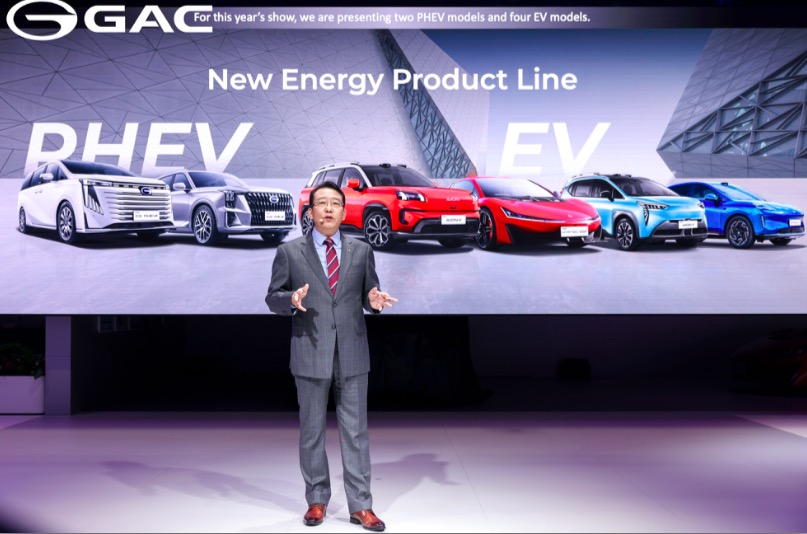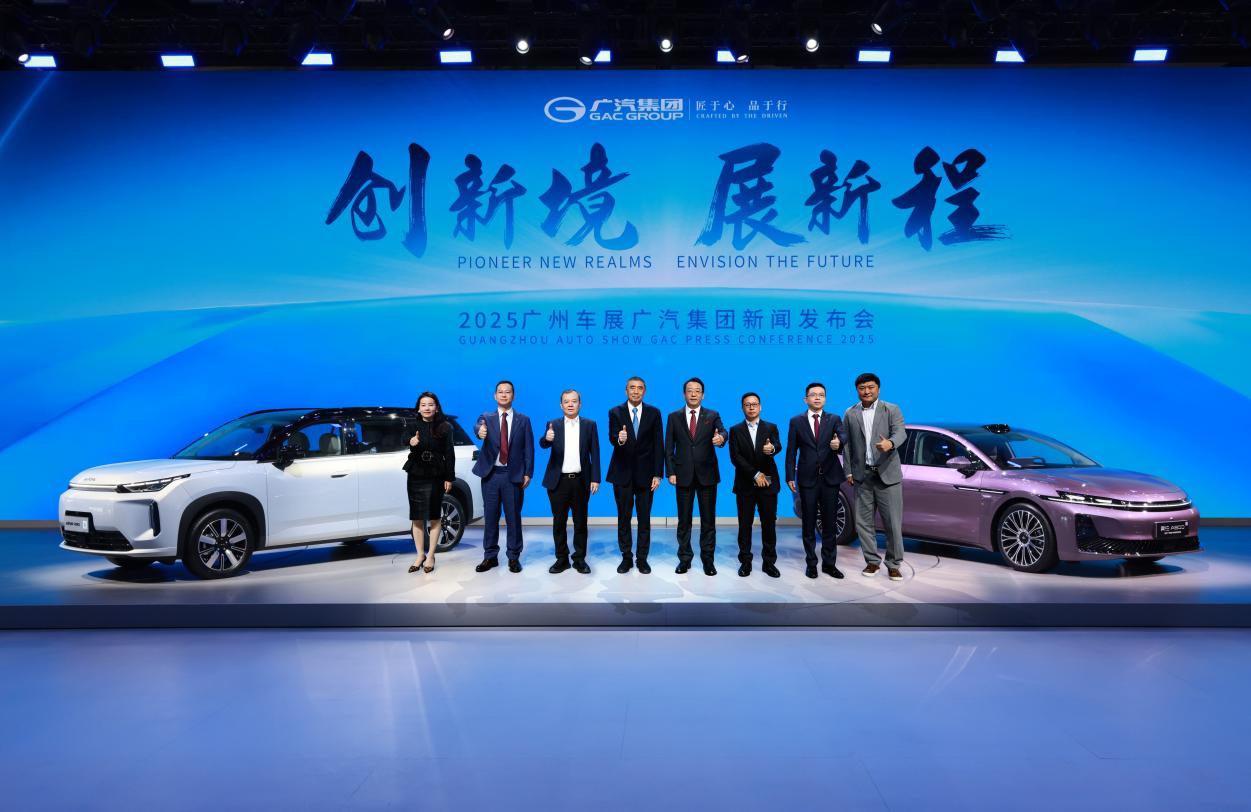
At the 2024 Paris Auto Show, GAC Group General Manager Feng Xingya met with Xiaopeng Motors Chairman He Xiaopeng. The two engaged in friendly conversation and agreed to further discussions after returning to China, sharing insights and resources.
As leading representatives of the transformation from traditional automotive companies to the smart electric era, GAC Group and Xiaopeng Motors each have their own technical advantages, distinct marketing styles, and differing strategic rhythms.
However, in the highly competitive landscape of the Chinese market, both traditional automakers and new players are eyeing international expansion as a common goal. A new model of coexistence, characterized by mutual benefit and collaboration, has emerged. As Feng Xingya wrote on Weibo on October 14th, "Let's collectively usher in a new era of Chinese brands going global."

GAC Group General Manager Feng Xingya
With the announcement of GAC Group's European strategy, it has indeed stepped into a new era of going global.
According to the plan, GAC intends to push products into several European countries within 2024. The newly unveiled second-generation Aion V will be the company's debut model in the European market, set to launch and deliver in Europe next year. In addition to the second-generation Aion V, other significant models such as the Aion Y Plus, Haobo SSR, Haobo HT, as well as hybrid versions of the Trumpchi E9 and ES9, are also present at the exhibition. As mentioned by Feng Xingya at the press conference during the Paris Auto Show, GAC will be introducing a series of pure electric and plug-in products to Europe in the future, extending beyond the current lineup on display.
Additionally, there is a further timeline to look forward to.
GAC Group plans to complete the construction of a parts transit center in Europe by 2025; and by 2028, it aims to achieve full market coverage in Europe, establishing a service support system that encompasses the majority of European countries.
The group directly manages international business, accelerating its overseas ventures
Europe has the oldest and most established automotive market worldwide, and local consumers possess deep-rooted understandings of vehicles and local brands. To establish a presence in this market, it requires not only products but also a comprehensive range of capabilities and systems, including brand recognition, service efficiency, and distribution channels. Although GAC Group's own brands did not start early—the first Trumpchi model launched only in 2010—over more than a decade of development, it has established a strong matrix of its three major brands: Trumpchi, Aion, and Haobo. This has equipped the group with substantial R&D capabilities and has cultivated solid brand depth domestically, laying a robust foundation for its rapid international expansion into Europe.
In fact, before entering the European market, GAC Group had already completed market setups across five major regions—Middle East, Americas, Africa, Southeast Asia, and Eastern Europe—covering 68 countries and regions. Production has commenced at KD factories for complete vehicles in countries like Thailand, Malaysia, and Nigeria, and a factory in Indonesia is expected to begin operations this year, forming an operational model of "two legs": vehicle export and localized production.
As a core segment of GAC Group's 14th Five-Year Plan, international business has been directly managed by the group since last year.
According to Feng Xingya, GAC plans to change its existing strategic control model to one focused on operations management, implementing an integrated operational reform for its brands. He explained, "The competitive entities and market structure in the Chinese market have undergone fundamental changes, making it necessary for the whole automotive group to operate its own brands at the group level."
The benefits of this shift are also apparent, "This significantly enhances the effectiveness of work and the speed of problem-solving. For instance, regarding parts supply, product pricing, logistics efficiency, and product development," Feng stated.
It is known that GAC International is fully responsible for the group's overseas business, specifically the export operations of Trumpchi and Aion—with the only exception being the Southeast Asian market. Feng Xingya revealed, "GAC has initiated a pilot project, allowing Aion to establish brand influence independently as a manufacturer, acting as a specialized force for entering the Southeast Asian market. Currently, whether to unify export operations under GAC International or let the manufacturer directly operate has its pros and cons."
Given the volatility and complexity of overseas markets, GAC Group will also grant GAC International greater independence moving forward, enhancing its coordination and support for personnel, finances, and resources.
In Feng Xingya's words, "The group is ready to roll up its sleeves and get to work." With that, entering Europe is akin to "breaking new ground."
Entering Europe, with a focus on products
Just as foreign car companies entering China expressed the ideology of "In China, for China", GAC Group's slogan for its European venture is "Integrated to Europe, Contribute to Europe."
How to enter Europe? Products must take the lead. Simply shipping Chinese cars overseas shows a lack of sincerity; adapting to local regulations and demands is the basic competency of a legitimate automaker. Better yet, products can even be developed specifically for the local market.
Of course, this needs to be approached step by step.
Currently, while the second-generation Aion V introduced is not a vehicle typically conceived for the local market, it is designed as a product aimed at global markets. Feng Xingya disclosed that although both domestic and international versions are called the second-generation Aion V, the internal development codes for the two models differ. Significant investment has been made to meet European standards, including enhanced data and intelligent safety requirements, as well as improvements in vehicle structure. From this perspective, it can also be considered a "product developed specifically for the European market."
Thanks to GAC Group's "three countries, five regions" layout of R&D and design centers, more models are now exhibiting "global characteristics." According to Zhang Fan, Vice President of GAC Research Institute, the Haobo SSR showcased at the auto show has its entire exterior and interior design crafted by the Los Angeles design team. "China lacks a history of designing and developing supercars; for typical designers, creating a supercar is incredibly challenging," he explained.
Zhang Fan also revealed that GAC Aion will launch an all-new premium urban vehicle at next month's Guangzhou Auto Show, designed primarily by the Milan design center.
Moreover, Zhang Fan addressed a trend, stating, "Today's trend of innovation in China is also influencing global markets. For instance, Chinese consumers sometimes demand more from automotive and travel experiences, and the trend of extended wheelbases in China is now feeding back into the North American and European markets, becoming a global commonality." From this trend, popular new technologies in China, like smart driving and intelligent cabins, may also become demands in global markets.
Integrating into Europe, following the right models
Profiting can be broken down into three levels—first relying on physical strength to accumulate capital, second utilizing intelligence to engage the market, and third maintaining stability through proper models. It's fair to say that establishing models and systems is a prerequisite for sustainable business development.
GAC Group has experienced a transformation from a general agent model to setting up subsidiary companies overseas. According to Feng Xingya, initially in the Middle East, GAC chose local partners as agents and distributors for sales; as international operations gradually expanded from 2018 to 2019, it began to establish subsidiaries in some countries and recruit local dealerships, like in Mexico. Additionally, GAC also set up a direct-sales store in Hong Kong as a pilot for exploring direct-sales models.
“For the European market, we aim to choose the optimal operational model,” Feng Xingya stated. “Although some Chinese companies have attempted direct-sales models, after thorough comparison, we currently prefer to initially collaborate with excellent partners through an agency model. In key countries, we will opt for establishing national subsidiaries to distribute and seek dealerships.”
With established operational models, the channels are assured. However, when it comes to how to sell effectively, it depends on the sales models. GAC International General Manager Wei Haigang told The Paper that European consumers' car usage habits differ greatly from those in China, and thus the sales models also vary. In Europe, automotive financing is very common, with many consumers using long-term or short-term leasing, subscription, or sharing modes for vehicle access. Some brands primarily target business clients in Europe, using subscription services rather than direct sales to individual consumers, such as NIO.
Considering these factors, GAC Group will adjust its approach for entering the European market based on local consumer habits. “For instance, our small-volume models will initially focus on subscription and leasing models for major clients while also offering products for individual consumers. Currently, we are fully researching how to better adapt to European market demands for both B2B and B2C to enhance sales performance.”
Data shows that from January to September, GAC Group has exported a total of 95,000 vehicles, a year-on-year increase of 112.0%. According to the goal of reaching annual sales of 500,000 vehicles by 2030, GAC Group needs to increase its overseas sales fivefold in the next five years.
Is it difficult? The challenges are significant, but there’s no need to rush. When GAC Group unveiled its European strategy, it coincided with the EU voting on new tax policies for Chinese electric vehicles. The new tariffs will undoubtedly impact every Chinese car company entering the European market, and GAC is no exception. However, while establishing factories could bypass tariff issues, and GAC has experience in overseas factory setups, this cannot serve as a justification for the EU to alter the established strategies of Chinese car firms. “Focus on practicality and proceed steadily; produce where there is demand, not just to circumvent tariffs” is GAC Group's foundational principle for going global.
If one were to summarize its European strategy in a sentence, it might echo Feng Xingya's quotation of a French proverb at the press conference—“Little by little, the bird builds its nest.”


